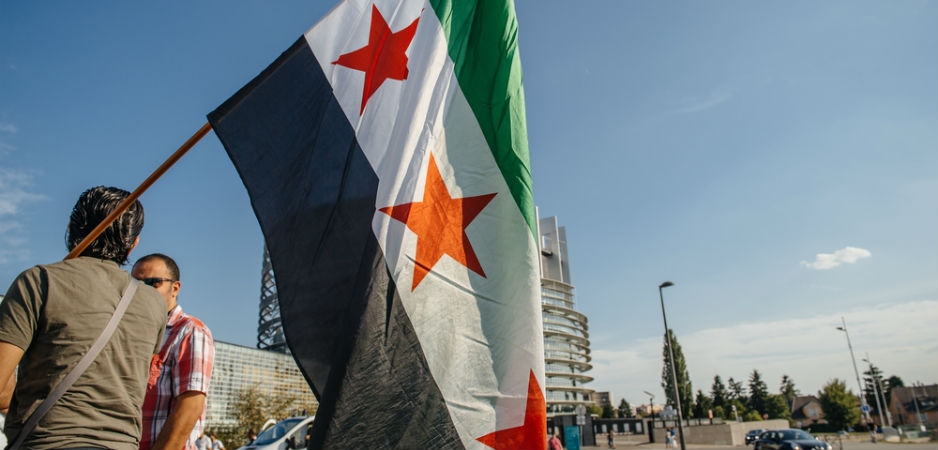Crises in the Middle East appear to be worsening at an exponential rate, making for a dangerously combustible mix and further complicating decisions for policymakers.
Events in Syria, Iraq, Iran, Saudi Arabia, the Palestinian Territories and as far as Europe appear to be spiraling as new actors enter the picture and old issues reemerge. These include: the significantly increased involvement of Russia in Syria; a new troublesome alliance in the region; exchanges of dangerous rhetoric between Saudi Arabia and Iran; a rash of spectacular terrorist attacks in the Sinai, Beirut and Paris; and a disturbing rise in violence in Palestine and Israel, especially Jerusalem.
Events on the Ground
Against the backdrop of other intractable issues in the region—Libya, Yemen, terrorism and uncertain economies, to name only a few—these events appear to be moving toward a perfect storm, in which solutions become ever more elusive and problems exponentially more serious.
Consider the following:
1) Russia’s move into Syria: With Syria-based fighter aircraft attacking non-Islamic State (often US-supported) opposition forces and even deploying ground troops, Russia has significantly altered the strategic landscape in the country. US and coalition options previously available either no longer exist or are constrained—for example, no-fly or safe zones. Russia’s transparent intervention on the side of Syrian President Bashar al-Assad in the Syrian conflict now transforms the conflict into a proxy war, pitting Russia and Iran against the US, Turkey, and their Arab and European partners.
2) Russia’s challenge to NATO and the US in the Middle East: The recent, allegedly stray flights by Russia’s fighters into Turkey are intended as a signal to Washington that it isn’t the only major power now in the Middle East and a warning to Turkey about siding with the US in stepped-up engagement in Syria. It is especially relevant given the recent parliamentary majority of Turkish President Recep Tayyip Erdogan’s party, and it would not be out of character for Russian President Vladimir Putin. It’s what he’s done in Ukraine and now in Syria by bombing US-backed opposition forces. It bears Putin’s signature MO: challenge the US.
3) The Moscow-Tehran-Baghdad-Damascus coalition: We can add Hezbollah and Iraqi Shia militias to this alliance as well. It has introduced new, or exacerbated existing, tensions; further complicated the situation in Syria and in Iraq; and unquestionably raised the stakes for the US and its Arab and Israeli allies.
4) Iran’s stepped-up and threatening rhetoric against Saudi Arabia in the wake of the Hajj tragedy: Iran’s bellicose rhetoric has injected new overtones into the Iranian-Saudi feud, having spun up Iranian public opinion and publicly challenged the Saudis. At the recent Vienna talks on the Syria crisis, harsh words were exchanged between the senior envoys of both countries.
5) An effective fatwa issued by 50+ Saudi clerics against Russia and all things Shia/Safavid (and even against the West and the US, who are seen as feckless): It will be seen as a call for jihad and will lead to new recruitment drives among Sunnis worldwide, whether intended, which is likely, or not. Moreover, it will also prompt new sources of money for jihadists in Syria and increased financial contributions from existing sources.
6) Public grousing in Saudi Arabia’s royal family: The public calls for removal of the recently installed King Salman and vicious verbal attacks on his 30-something son, Deputy Crown Prince and Prime Minister Prince Mohammed bin Salman, are unprecedented among Saudi Arabia’s customarily taciturn and unwavering royal family. A leadership shake-up, unlikely for the moment at least, would send tremors throughout the Muslim world and deal a major blow to one of America’s most steadfast, if waning, Arab partnerships.
7) Spectacular series of terrorist attacks: The Islamic State-claimed attacks first against the Russian airliner over the Sinai and then in Beirut and Paris against civilian targets mark a new and ominous turn for the world’s most dangerous and ruthless terrorist organization. While the attacks will likely spur greater military action against the Islamic State by Russia, France and the West, they succeeded in their mission: bring the fight to the West and inspire more recruits and donors.
8) Increased violence and unrest, and a call for a “Third Intifada” from Hezbollah’s Hassan Nasrallah, in the West Bank: The toll from these attacks—some 40-plus Palestinians and nearly a dozen Israelis—is likely to rise. Palestinian authorities and security forces will be hard pressed to control this, even with the best of intentions. Given the lone wolf nature of the attacks, even Israelis security forces will be challenged to stop them.
Declining Confidence in the US
We should not underestimate the highly volatile potential of this latter issue. For it may serve to galvanize the whole sordid range of “undesirables” in the region—Iran’s Islamic Revolutionary Guard Corps (IRGC), who are leading the fight in Syria on behalf of Assad against opposition forces; the Islamic State (IS); Hezbollah; Shia militia forces from Iraq, Pakistan and Afghanistan; al-Qaeda and its affiliate in Syria, Jabhat al-Nusra; the Muslim Brotherhood; the Syrian regime’s Assad; and jihadists throughout the Muslim world—all vying to be the anointed leader of the anti-Zionists. Antipathy toward Israel, and ultimately the United States, is the one and only unifying component of them all.
Right now, America’s Arab and Israeli allies have very little faith in this administration’s ability to manage a region that is spiraling. The series of earlier regional policy disasters … provide little solace to them that Washington knows how to confront the current gathering storm.
The tensions in the West Bank bear particularly close watching. Palestinians are as frustrated with their ineffectual leadership as they are angry with Israel. However, it is the latter that will get the lion’s share of attention and blame. Palestinian President Mahmoud Abbas is a lame duck. It is doubtful if he can command Palestinian security forces or control the Palestinian street. The frustration, hopelessness and desperation in the streets of Jerusalem, the West Bank and Gaza and in social media chatter are palpable.
All this takes place amid all the other issues plaguing the region and of declining confidence in the US. The region lacks leadership and overarching strategy for dealing with this tempest of events. That renders predictions off the charts.
The crises call for extreme caution by the US administration. But the US will have to act. To confront the amplified IS challenge, a coordinated effort will be essential. Moreover, continued air and drone strikes and one-off special operations will be insufficient. What the West and affiliated Arab governments need are victories on the ground in Iraq and Syria. A coherent plan for doing that has been lacking even now as nations declare war against the Islamic State.
In the uprising in the Palestinian Territories, the US should: reaffirm its support for Israel; reassert its position on the two-state solution (despite declining support/hope on both sides of the security wall for it); consider calls for new, internationally supervised elections for the Palestinian Authority (caveat being that only parties and candidates subscribing to the Quartet Principles may run); and give some thought to a new United Nations Security Council resolution that would give Palestinians some hope as opposed to futility and the fate of violence.
All those who pledged aid for Gaza must deliver and then work closely with Israel to ensure it gets there quickly and that genuine development can take place in Gaza without Hamas interference. Israeli-Palestinian peace negotiations are a non-starter, however. Israeli Prime Minister Benjamin Netanyahu is right: He has no credible Palestinian negotiating partner capable of delivering. Abbas has lost all standing among Palestinians, and even if he could reach an agreement, neither Palestinians nor Arabs in general would support him.
The US must also decide how it will meet the Russian/Iranian challenge—not only to restore stability in the region, but also to secure diminishing Arab and Israeli confidence in America. That does not mean a major deployment of US forces, but it will require resolute action to reassert its leadership and commitment to its allies, perhaps first by articulating a plan for annihilating IS. Syria and Iraq beg for serious policy reevaluation and decisiveness in Washington.
Right now, America’s Arab and Israeli allies have very little faith in this administration’s ability to manage a region that is spiraling. The series of earlier regional policy disasters—Iraq, Egypt, Libya, Yemen, the Iran nuclear accord (according to some), the four and a half-year Syrian Civil War and a futile attempt to broker an Israeli-Palestinian peace—provide little solace to them that Washington knows how to confront the current gathering storm.
That means the Middle East may very likely get worse before it gets better and in ways no one may foresee. And that’s never good for this part of the world.
The views expressed in this article are the author’s own and do not necessarily reflect Fair Observer’s editorial policy.
Photo Credit: Hadrian / Drop of Light / Shutterstock.com
 We bring you perspectives from around the world. Help us to inform and educate. Your donation is tax-deductible. Join over 400 people to become a donor or you could choose to be a sponsor.
We bring you perspectives from around the world. Help us to inform and educate. Your donation is tax-deductible. Join over 400 people to become a donor or you could choose to be a sponsor.
Support Fair Observer
We rely on your support for our independence, diversity and quality.
For more than 10 years, Fair Observer has been free, fair and independent. No billionaire owns us, no advertisers control us. We are a reader-supported nonprofit. Unlike many other publications, we keep our content free for readers regardless of where they live or whether they can afford to pay. We have no paywalls and no ads.
In the post-truth era of fake news, echo chambers and filter bubbles, we publish a plurality of perspectives from around the world. Anyone can publish with us, but everyone goes through a rigorous editorial process. So, you get fact-checked, well-reasoned content instead of noise.
We publish 2,500+ voices from 90+ countries. We also conduct education and training programs
on subjects ranging from digital media and journalism to writing and critical thinking. This
doesn’t come cheap. Servers, editors, trainers and web developers cost
money.
Please consider supporting us on a regular basis as a recurring donor or a
sustaining member.
Will you support FO’s journalism?
We rely on your support for our independence, diversity and quality.







